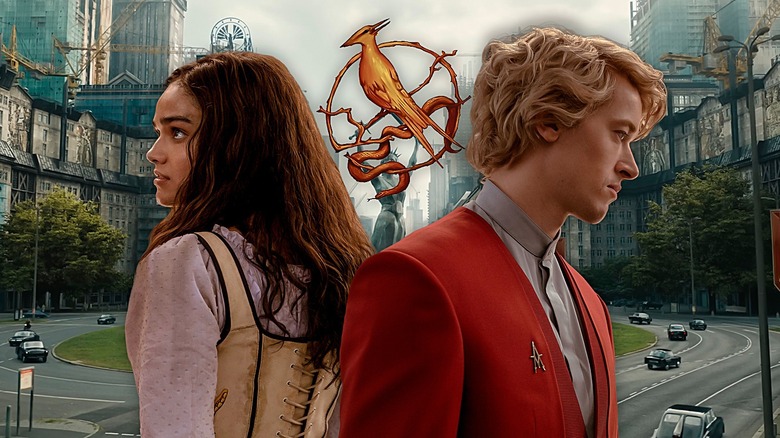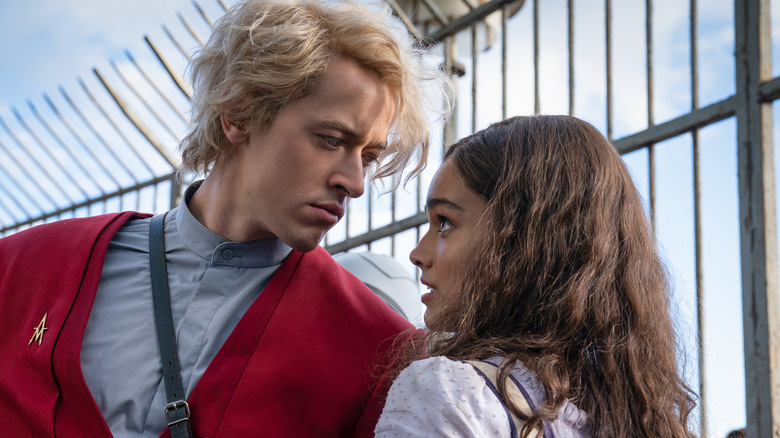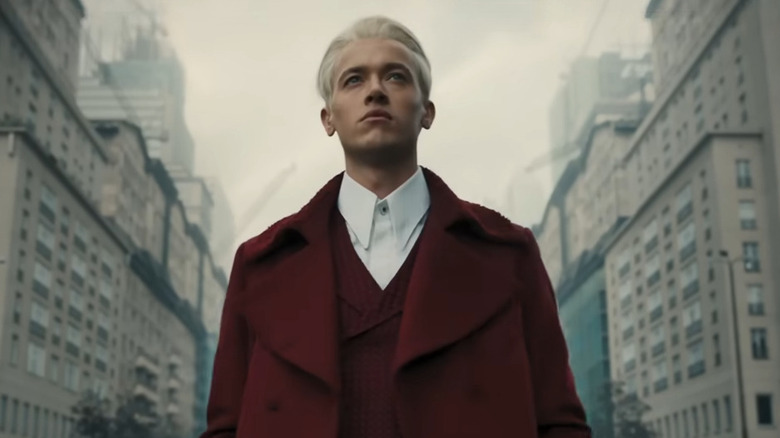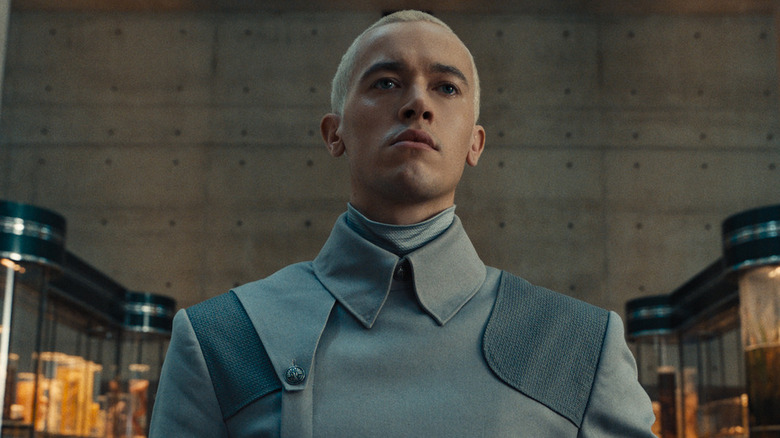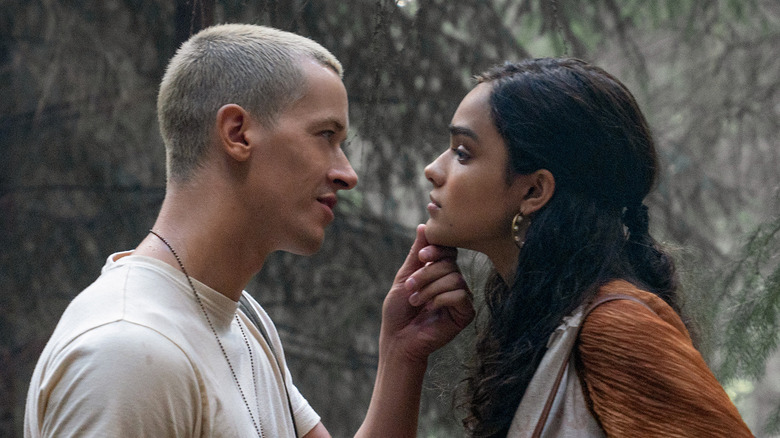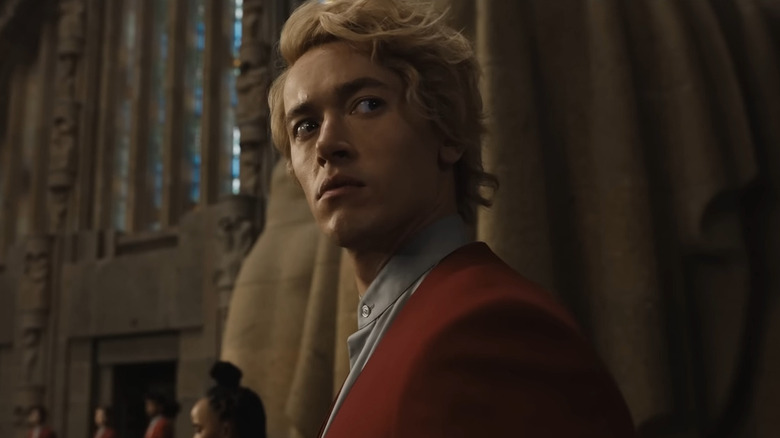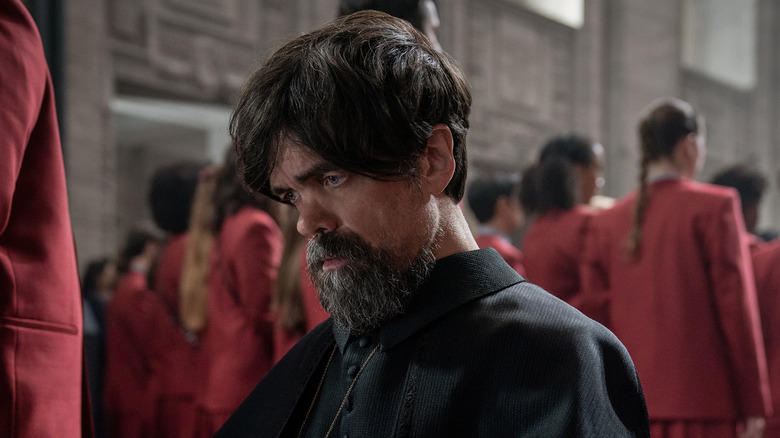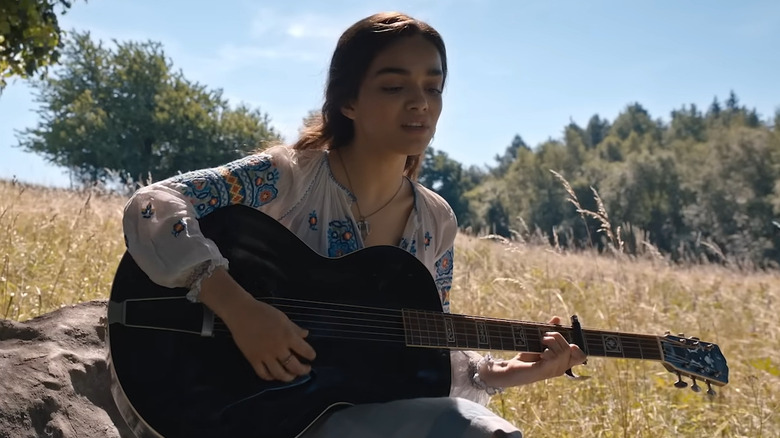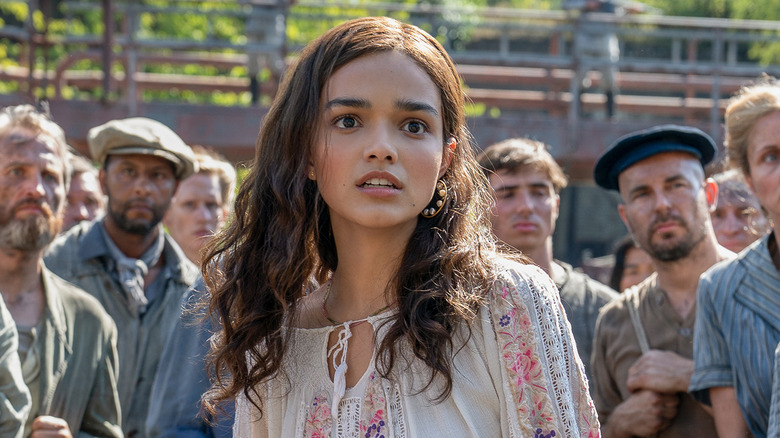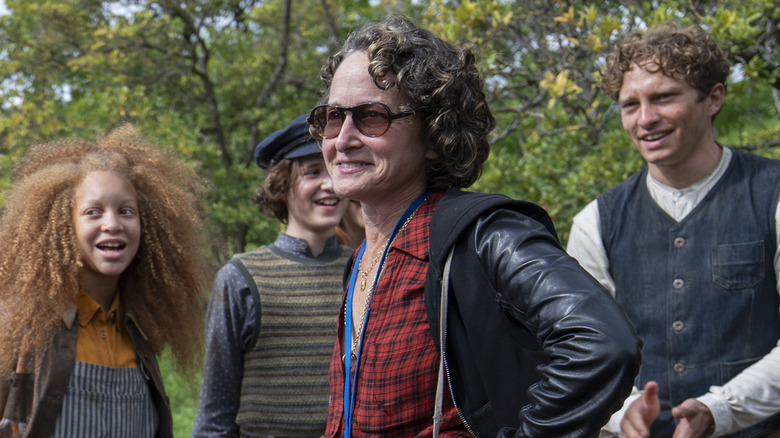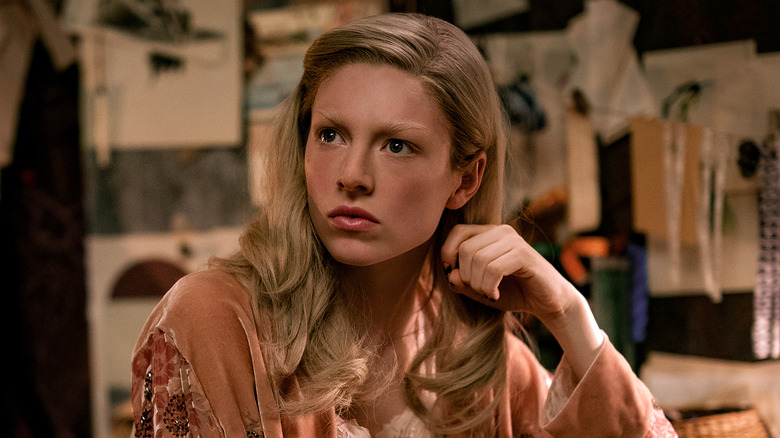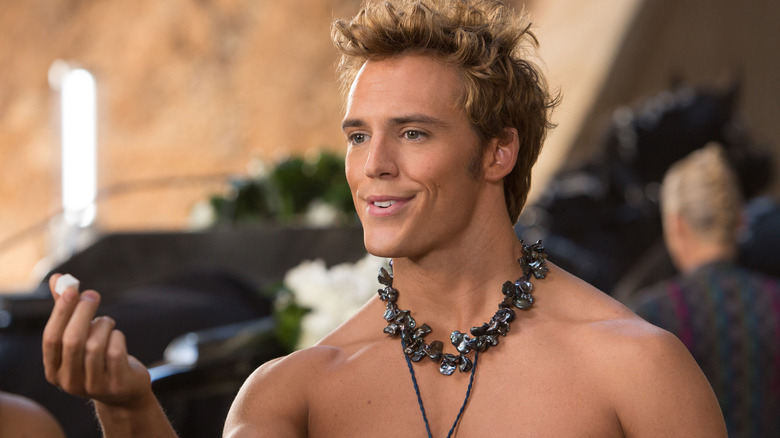The Ending Of The Hunger Games: The Ballad Of Songbirds And Snakes Explained
Contains spoilers for "The Hunger Games: The Ballad of Songbirds & Snakes"
"The Hunger Games: The Ballad of Songbirds & Snakes" is a prequel to the popular young adult franchise "The Hunger Games." Originally consisting of three books by Suzanne Collins and four movies, the dystopian series grew with a new book in 2020 and now a new film adaptation.
This time, audiences are thrown back in time to the 10th Hunger Games, watching as Coriolanus Snow (Tom Blythe), a character they've come to know as President Snow, is a young adult trying to win an award from school that will pay his way through university. He doesn't anticipate being one of the first mentors in the Hunger Games. Snow and his friend Sejanus Plinth (Josh Andrés Rivera) act as mentors, with Snow's cousin Tigris (Hunter Schafer) guiding him from the sidelines. As he tries to help Lucy Gray Baird (Rachel Zegler), a District 12 tribute, survive the Games, his life changes completely as he questions who he is and the life he wants to lead.
Grab a plate of potatoes and get ready to head back to Panem. Here's everything you need to know about the 10th Hunger Games, Snow's short-lived excursion to the districts, and where he and Lucy Gray landed after the Games.
What you need to remember about the plot of The Hunger Games: The Ballad of Songbirds & Snakes
"The Ballad of Songbirds & Snakes" takes audiences through the 10th Hunger Games and Coriolanus Snow's role as a mentor to Lucy Gray Baird, the female tribute from District 12. The Snow family is in ruin, unable to pay rent and struggling to maintain their place in Capitol society. The Plinth Prize, a scholarship to the Capitol university, should change their life, but the Academy students find out they need to complete one last project to prove themselves before the winner's announcement.
Each student in the graduating class is assigned a tribute to mentor. Their job is to make a spectacle of them to encourage Capitol citizens to watch the annual Games. Snow takes this job seriously, going against the grain and breaking the rules of the project to guide Lucy Gray to victory. However, his choices catch up with him when the dean of the Academy, Casca Highbottom (Peter Dinklage), discovers Snow's cheating and banishes him to a 20-year sentence as a Peacekeeper.
Snow pays off a member of the Capitol military to be assigned to District 12, wanting to know if Lucy Gray made it home. While there, Snow continues to make decisions to ensure his survival, even if it means condemning Sejanus to death and almost running away with Lucy Gray. However, Snow ends up the victor, returning to the Capitol for school with new wealth and a deadly new outlook on life.
What happened at the end of The Hunger Games: The Ballad of Songbirds & Snakes
After Snow kills the mayor's daughter and witnesses the death of her boyfriend alongside Sejanus and Lucy Gray, he and the winner of the 10th Hunger Games decide to run away from Panem and go up north. While on their journey, the dynamic between the two changes when Lucy Gray realizes Snow lied to her about his involvement with Sejanus' death. When they make it to a cabin, she heads off allegedly in hunt of katniss, but actually leaves Snow on his own.
Snow puts together what she's doing and follows her, resulting in a snake bite from a trap she sets. When he thinks he sees her, he uses a gun to shoot in her direction. She falls, but when he checks on her, she's gone. After yelling into the void for some time, Snow heads back to District 12, ready to go to officer training in District 2. However, he's instead sent to the Capitol for an apprenticeship under Dr. Volumnia Gaul (Viola Davis), the Head Gamemaker of the 10th Games, because of the information he sent her about Sejanus and the rebels.
In going back to the Capitol, Snow's school expenses are paid for by the Plinths in memory of their dead son. But, Snow can't have someone ruining his new beginning. He eliminates who he perceives as his final enemy: Highbottom.
Snow goes on an emotional journey
When audiences meet Snow, he is self-assured and confident that he will be the winner of the Plinth Prize. However, the new project causes him to question the purpose of the Games and the inherent nature of humankind. He finds himself struggling with his motivations to cheat, telling himself it's for Lucy Gray, not for himself.
After entering the arena to save Sejanus after his friend makes a poor decision, Snow kills one of the tributes. He realizes how quickly someone's goals can change to protect themselves but seems shell-shocked that he took someone's life. At this moment, Snow understands that humans will do anything in the name of self-preservation, and he needs to act first moving forward.
When he moves to District 12 as part of his military service, this conviction only intensifies as he begins to hurt others for his own gain. He kills someone who could report Sejanus' actions, which would take Snow down in turn because of their friendship. He then throws Sejanus under the bus, keeping his name clear.
Lucy Gray turns the tables on him. Seemingly bested at his own game, Snow violently lashes out in the forest before returning to District 12 and continuing on to the Capitol. In poisoning Highbottom, he cements his new life view and how he will handle business moving forward. It's a dark path, but Snow doesn't hesitate.
You can't trust just anyone
The movie opens with Snow's trust in the Academy falling through. He works hard to earn the Plinth Prize so he can support his family and go to university, only to find out at the last minute there's another obstacle to overcome before he can claim the award as his own. Then, he can't trust this new obstacle because Highbottom says he will do anything to prevent Snow from winning the scholarship.
He also learns that, despite the mutual agreement that they trust each other, he can't trust Lucy Gray, even though he gives up everything for her. He uses the last of his money to bribe his way into a District 12 assignment to make sure she is alive. He willingly runs away with her toward the end of the movie, turning away from his plan of returning to the Capitol.
In his eyes, Lucy Gray betrays him. She leaves him, setting up a trap so a snake bites him, and decides to continue on without him. She is the only person he can trust in the districts, and when she leaves him, his grandmother's ideas about the nature of "district" people resonate with Snow.
At this point, Snow can't trust anyone but himself. To him, the only person looking out for him is himself. It's an important lesson to learn and helps inform audiences about the choices Snow makes moving forward.
Only the most cutthroat people survive
As audiences watch Snow make tough decisions, it becomes clear that he's able to crawl his way back to the Capitol because he is willing to be as cruel as necessary. He's responsible for the death of Sejanus, quickly turns on Lucy Gray when he feels threatened, and doesn't hesitate to poison Highbottom.
Snow rationalizes his actions during the Games because he's trying to help someone else in a way that significantly benefits him. He argues it doesn't just benefit him since it also ensures his cousin and grandmother are taken care of. However, his actions in District 12 are purely for personal gain and show how he lets go of being a good person. He doesn't hesitate to turn Sejanus in or turn his gun towards Lucy Gray. If he cares about them and is a "good" person, he would think twice about his actions. Instead, he doesn't hesitate when someone isn't serving a purpose in his life anymore.
Though he hides it initially, Snow has no qualms over hurting people he cares about so his life goes how he wants it to. And, though brutal, he is the one who survives in the end, which only reinforces to him that he makes the right choices in these situations.
You don't have to forget your humanity in dark times
"The Ballad of Songbirds & Snakes" shows every side of humanity, from the good to the evil. While audiences see both the songbird and snake sides of Snow and Lucy Gray, the character we see with more humanity than expected is Casca Highbottom. In the final moments of the movie, we learn that Highbottom, along with Snow's father, is responsible for the Hunger Games. Highbottom had a drunk idea that Snow's father submitted to Dr. Gaul.
Years later, Highbottom feels guilty that his idea caused the death of so many children. He admits to Snow that he tried to cancel the Games and now fears that Snow's actions will ensure the Games live on, forcing Highbottom to continue to have blood on his hands. This information, combined with the knowledge that he gave Lucy Gray money before she went back to District 12, reinforces that, despite what he's been through, Highbottom never lost his humanity. He doesn't have to give Lucy Gray anything, yet he makes sure she's taken care of.
In contrast, Snow arguably loses his humanity, following the same path as Dr. Gaul. He comes around to believing that all humans are inherently evil, and the Games simply remind the citizens of Panem of that. Snow takes on his father's role, being the "evil" counterpart to Highbottom's "good." A generational trait repeats again as Snow provides more ideas for the Games and ensures they will continue.
Someone can come back to haunt you
There are several connections between Lucy Gray Baird and Katniss Everdeen, from being underestimated District 12 tributes to causing Snow to recall his previous self. Lucy Gray is a captivating performer, choosing to sing instead of fight. Everyone in the Capitol is immediately captivated by her, from her colorful dress to her haunting music.
No one will forget her songs. "The Hanging Tree" is passed down, again utilized in the Second Rebellion by Katniss. In Lucy Gray's final moments near Snow, she uses the mockingjay, a bird that will repeat any tune it hears, and Jabberjays, a muttation that will repeat phrases word for word, to her advantage. She forces Snow to listen to her sing one last time, making a lasting impact on the young adult.
The birds are a metaphor for Katniss Everdeen, the mockingjay of the Second Rebellion, and how the goodness that Lucy Gray embodies will come back to haunt Snow. Though Katniss is a fighter forced to appeal to the masses, she reminds him of his tribute with her tenacity and how she eventually enchants the citizens of the Capitol.
The symbolism between Lucy Gray and Katniss is a lesson that you can never forget someone who makes their mark on you. In Snow's case, it's the reminder of the person who forced him to question everything, who he thought he left behind in the trees of District 12.
What happened to Lucy Gray Baird?
While Lucy Gray seemingly got up and walked away after falling in the forest, what happened to her remains a mystery. There are numerous theories trying to account for her life and death, many of which first materialized with the release of the book. Plenty of them still apply to her ambiguous ending in the film.
One of the leading theories is that Lucy Gray survives, eventually returning to District 12, where she had children and became Katniss Everdeen's grandmother. This theory hinges on the passing down of "The Hanging Tree" song, the similarities in their personalities, and how they vex Snow. Some even argue that President Snow suspects this, and that's why he feels so threatened by Katniss. Some fans even suggest that the Reaping of the 74th Hunger Games is rigged, much like Lucy Gray's was, to force Katniss into the arena.
Another theory is that Lucy Gray did make it up north, starting a new life away from Panem and breaking free from the rule of the Capitol. In a similar vein, variations of the theory say she made it to District 13, becoming a part of the underground society that lives there after the First Rebellion. Maybe she continued to watch Snow from afar, seeing how the man she thought she knew turned away from the light forever.
What the producer has said about the ending
The ending of "The Ballad of Songbirds & Snakes" has many moving parts. However, the creative team argues fans shouldn't be surprised by the turn of events and should consider how it contributes to the continuation of the Games.
"You have to have this like, desire to somehow want to see him go make a different decision, even though you know he won't," Jacobson shared in an interview with Screen Rant. "And yet, ultimately, you have to get to a place where it feels really satisfying, when he finally lets go of the impulse to do good, and let himself be the villain we know he will ultimately become."
"The idea that there was this moment where [the Games] might have all gone away," Jacobson also stated. "And to find out that Snow was instrumental in that shift, and the gamification and blitzing up, of the games... That I found really intriguing."
Jacobson and director Francis Lawrence agree that there was never a question as to whether Snow would go down a dark path, it was just a matter of what he would encounter along the way and how these obstacles would impact his journey.
What the end of The Hunger Games: The Ballad of Songbirds & Snakes means for the possibility of a sequel
"The Ballad of Songbirds & Snakes" doesn't have a mid-credits or post-credits scene, leaving audiences with nothing to chew on as they speculate what a sequel could look like. While there isn't another book (yet) between "The Ballad of Songbirds and Snakes" and "The Hunger Games," the creative team behind the movies has ideas about where a sequel could go.
"I would love to see Snow's rise to power because he's just a great character," Jacobson discussed with PEOPLE. "But Tigris, and understanding how this girl who loves him so and cares for him and becomes the woman that we saw in 'Mockingjay,' that I'm really fascinated by." Hunter Schafer agrees. "I want to know what happens, even if I wasn't playing her," the actress shared with Entertainment Weekly. "I want to know how we get there."
Lawrence and Jacobson do note that Suzanne Collins has the final say, though they are always open to hearing her ideas. "If Suzanne has another thematic idea that she feels fits into the world of Panem ... I'd be really interested in looking at it and being a part of it." Lawrence shared with EW.
What the end of The Hunger Games: The Ballad of Songbirds & Snakes means for the future of the franchise
Like the possibility of sequels following Snow's rise to President of Panem or Tigris, there are other stories fans of the series would love to see. Two that come up often are Haymitch's Hunger Games, which are the 50th Hunger Games and a Quarter Quell that dictated double the amount of tributes entered the arena, and Finnick's Games, which he won at 14 years old as the youngest Victor up to that point.
While additional films of this nature would satiate the fanbase's desire for more content, Collins "always writes from a thematic foundation," in Lawrence's words to EW. That foundation needs to be there for more books or films to come next. "I don't have any pull of just going, 'I would love to do Finnick's games,'" Lawrence shared in the interview. "He's a great character, but what's the thematic underpinnings that make it worth telling and relevant?"
That means the future of the film franchise rests in the hands of the author. The creative team is willing and ready to bring more stories to life, but only if Collins is the one writing them.
